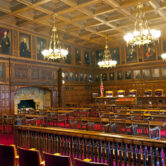MANHATTAN (CN) — The Second Circuit shut the door Monday on users of a fantasy sports site trying to hold Major League Baseball liable for letting them bet on a zero-sum game.
“At its core, this action is nothing more than claims brought by disgruntled fantasy sports participants, unhappy with the effect that cheating in MLB games may have had on their level of success in fantasy sports contests,” U.S. Circuit Judge Joseph Bianco wrote for a three-judge panel.
“We hold that alleged misrepresentations or omissions by organizers and participants in major league sports about the competition itself — such as statements about performance, team strategy, or rules violations—do not give rise to plausible claims sounding in fraud or related legal theories brought by consumers of a fantasy sports competition who are utilizing a league’s player statistics,” the 75-page opinion from the Trump appointee states.
Filed in Southern District of New York in January 2020, the $5 million federal class action led by Kristopher Olson accused the MLB of consistently promoting and engaging in fantasy baseball wagering contests through sites like DraftKings that were “corrupt and dishonest.”
Represented by David Golub with the Connecticut firm Silver Golub & Teitell, the DraftKings fantasy players said MLB dishonestly marketed fantasy baseball with statistical data that was corrupted by a 2017 cheating scandal in which the teams Houston Astros and Boston Red Sox used electronic devices to steal opposing catchers’ signs.
The fans claim MLB deprived them of their exercise of skill in the fantasy baseball contests, but Bianco found no plausible allegation that the fans relied ”upon the alleged fraudulent and negligent misrepresentations about player performance and electronic sign-stealing.”
“Apart from actual reliance, no consumer of fantasy baseball competitions could plausibly allege that, in paying to participate in the competition, they reasonably relied upon these statements in believing that the sport of major league baseball was free from intentional violations of league rules by teams and/or individual players,” Bianco wrote.
“Instead, any reasonable spectator or consumer of sports competitions — including participants in fantasy sports contests based upon such sporting events — is undoubtedly aware that cheating is, unfortunately, part of sports and is one of many unknown variables that can affect player performance and statistics on any given day, and over time,” the ruling continues.
Representatives for both parties did not immediately respond to request for comment Monday afternoon.
U.S. District Judge Jed Rakoff, a fervent Yankees fan, tossed the suit in April 2020 on a motion to dismiss. Though he agreed that the baseball cheating scandal wounded fans across the country, he said it did not give daily fantasy bettors a basis to sue for fraud.
Rakoff noted that the Third Circuit’s ruling in the “Spygate” case was one of three instances where federal circuits declined to hold that sports organizations owe similar duties even to their direct customers, ticketholders.
But the fantasy players argued on appeal that a jury should get the chance to study the misrepresentations they say were passed along by the league, including “expert recommendations” of professional baseball players for inclusion in fantasy contest lineups on the league’s television network.
The appeals panel hinted at the unlikeliness of a reversal during oral arguments in December 2020, when Senior U.S. Circuit Judge Gerard Lynch noted, “baseball has all sorts of cheating and always has.”
Judges Bianco and Lynch, the latter an Obama appointee, were joined on the panel by Chief Judge Debra Livingston, a George W. Bush appointee.
The court also ruled that a letter detailing a 2017 investigation into the Yankees should be made public, rebuffing the request from the Yankees and the league to keep the letter private.
The fantasy players previously alleged that a 2017 press release from MLB commissioner Rob Manfred detailing the sign-stealing antics concealed the full nature of what the league had found the Bronx Bombers to have done during the scandal.
“The Yankees argue that the harm from the unsealing of the Yankees Letter will arise because its content ‘would be distorted to falsely and unfairly generate the confusing scenario that the Yankees had somehow violated MLB’s sign stealing rules, when in fact the Yankees did not,’” Bianco wrote.
Subscribe to Closing Arguments
Sign up for new weekly newsletter Closing Arguments to get the latest about ongoing trials, major litigation and hot cases and rulings in courthouses around the U.S. and the world.








